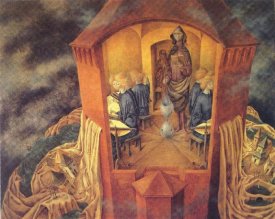Sitaram
kickbox
The Sound Word
Sound mind, sound doctrine, Long Island Sound, sounding the depths, are all the same word “sound.” Sound right?
"Conversation is an art," they say. Reading may be an art or a science depending upon whether you simply read or read into. When I was a child, I read as a child; thought as a child; understood as a child. When I matured, I did not put away childish things, but began to play ruthlessly with words and ideas. Words are instruments of thought and make a music more than tinkling symbols and brash prose. Siddhartha upon the banks learned from a stringed instrument of the middle way that we must not be too loose or we shall not sound nor yet too tight lest we break.
When we play an instrument just right then we say that it “sounds.” The sound lurks within, a secret, hidden. When we publish and publicize, it becomes more secret; more hidden. We supply breath or spirit; inspiration. A music of the spheres is a circle of fifths on a scale of one to eight. We play instruments and we play on words. Play is the industry of childhood and adults are a by-product of concern to environmentalists.
To speak or read or write we must have an “about.” “Speak of the Devil,” Goethe did. We speak about this. We write about that. We read about something else. “About” suggests a circle. Now, to talk in circles is reckoned not a virtue but a flaw, though not a tragic flaw.
Speaking of circles, Milan Kundera ends his novel, “The Unbearable Lightness of Being,” with a circle:
Plato is circles. Aristotle is lines.
Aristotle asks Kundera, “Why the circle?”
Kundera replies:
Plato asks Kundera, “Why the butterfly?”
Kundera replies:
Sitaram asks Kundera, “Why Karenin?”
Tolstoy replies:
Sound mind, sound doctrine, Long Island Sound, sounding the depths, are all the same word “sound.” Sound right?
"Conversation is an art," they say. Reading may be an art or a science depending upon whether you simply read or read into. When I was a child, I read as a child; thought as a child; understood as a child. When I matured, I did not put away childish things, but began to play ruthlessly with words and ideas. Words are instruments of thought and make a music more than tinkling symbols and brash prose. Siddhartha upon the banks learned from a stringed instrument of the middle way that we must not be too loose or we shall not sound nor yet too tight lest we break.
When we play an instrument just right then we say that it “sounds.” The sound lurks within, a secret, hidden. When we publish and publicize, it becomes more secret; more hidden. We supply breath or spirit; inspiration. A music of the spheres is a circle of fifths on a scale of one to eight. We play instruments and we play on words. Play is the industry of childhood and adults are a by-product of concern to environmentalists.
To speak or read or write we must have an “about.” “Speak of the Devil,” Goethe did. We speak about this. We write about that. We read about something else. “About” suggests a circle. Now, to talk in circles is reckoned not a virtue but a flaw, though not a tragic flaw.
Speaking of circles, Milan Kundera ends his novel, “The Unbearable Lightness of Being,” with a circle:
Up out of the lampshade, startled by the overhead light, flew a large nocturnal butterfly that began circling the room.
Plato is circles. Aristotle is lines.
Aristotle asks Kundera, “Why the circle?”
Kundera replies:
Therein lies the whole of man’s plight. Human time does not turn in a circle; it runs ahead in a straight line. That is why man cannot be happy: happiness is the longing for repetition.
Plato asks Kundera, “Why the butterfly?”
Kundera replies:
No one can give anyone else the gift of the idyll; only an animal can do so, because only animals were not expelled from Paradise. The love between dog and man is idyllic. It knows no conflicts, no hair-raising scenes; it knows no development. Their dog, Karenin, surrounded Tereza and Tomas with a life based on repetition, and he expected the same from them.
Sitaram asks Kundera, “Why Karenin?”
Tolstoy replies:
Happy families are all alike.



